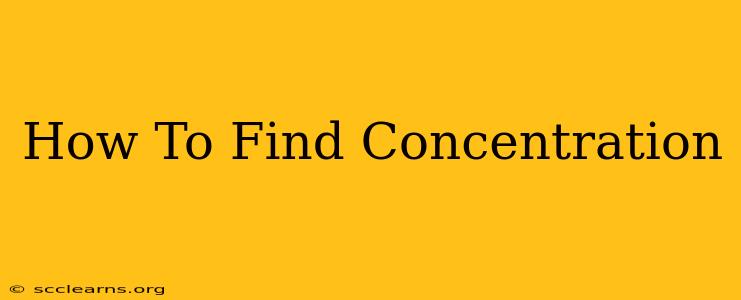Are you struggling to concentrate? Do you find yourself easily distracted, leaving tasks unfinished and feeling overwhelmed? You're not alone. Many people experience difficulties with concentration, but with the right techniques and strategies, you can significantly improve your focus and achieve your goals. This guide will explore practical methods to help you find your concentration and unlock your full potential.
Understanding the Roots of Poor Concentration
Before diving into solutions, it's crucial to understand why you might be struggling to concentrate. Several factors can contribute to poor focus, including:
Internal Factors:
- Stress and Anxiety: High levels of stress and anxiety are major culprits. When your mind is racing with worries, it's difficult to concentrate on the task at hand.
- Lack of Sleep: Sleep deprivation significantly impacts cognitive function, including concentration and attention span.
- Poor Diet: Unhealthy eating habits can lead to energy crashes and brain fog, making it harder to focus.
- Underlying Medical Conditions: Certain medical conditions, such as ADHD, can affect concentration. If you suspect an underlying condition, consult a healthcare professional.
- Mental Health: Conditions such as depression and anxiety can significantly impair concentration and focus.
External Factors:
- Distracting Environments: A noisy or cluttered workspace can make it nearly impossible to concentrate.
- Multitasking: Trying to juggle multiple tasks simultaneously often leads to reduced efficiency and poor focus on any one task.
- Technology: Constant notifications from phones, emails, and social media are significant distractions.
Proven Techniques to Boost Your Concentration
Now that we've identified potential causes, let's explore effective strategies to enhance your concentration:
1. Minimize Distractions:
- Create a Dedicated Workspace: Designate a specific area for work or study, free from clutter and distractions.
- Turn Off Notifications: Silence your phone, close unnecessary tabs on your computer, and let others know you need uninterrupted time.
- Use Noise-Cancelling Headphones: Block out external noise with headphones or earplugs. Consider using ambient sounds or white noise to help you focus.
- Communicate Your Need for Focus: Inform family members or colleagues that you need uninterrupted time to concentrate.
2. Optimize Your Environment:
- Good Lighting: Ensure your workspace is well-lit to promote alertness and focus.
- Comfortable Temperature: A comfortable temperature can significantly impact your ability to concentrate.
- Organize Your Workspace: A clean and organized workspace promotes a clear and focused mind.
3. Practice Mindfulness and Meditation:
- Mindfulness exercises: Regular mindfulness practice can train your brain to focus on the present moment, reducing mind-wandering.
- Meditation: Meditation helps to calm the mind and improve concentration by reducing stress and promoting relaxation.
4. Prioritize and Plan:
- Break Down Tasks: Large tasks can feel overwhelming. Break them down into smaller, more manageable steps.
- Time Management Techniques: Use techniques like the Pomodoro Technique (working in focused bursts with short breaks) to improve efficiency and concentration.
- Prioritize Tasks: Focus on the most important tasks first when your energy levels are highest.
5. Take Regular Breaks:
- Short Breaks: Short breaks throughout the day can help prevent burnout and maintain focus. Step away from your workspace, stretch, or take a short walk.
- Longer Breaks: Incorporate longer breaks for relaxation and rejuvenation.
6. Improve Your Lifestyle:
- Prioritize Sleep: Aim for 7-9 hours of quality sleep each night.
- Healthy Diet: Eat a balanced diet rich in fruits, vegetables, and whole grains to fuel your brain.
- Regular Exercise: Physical activity improves blood flow to the brain, enhancing cognitive function and concentration.
- Hydration: Dehydration can lead to fatigue and difficulty concentrating. Drink plenty of water throughout the day.
7. Seek Professional Help:
If you continue to struggle with concentration despite trying these strategies, consider seeking professional help from a doctor or therapist. They can help identify any underlying medical or mental health conditions that may be contributing to your difficulties.
Conclusion: Finding Your Focus is a Journey
Improving your concentration is a journey, not a destination. Be patient with yourself, experiment with different techniques, and find what works best for you. By consistently implementing these strategies, you can significantly improve your focus, productivity, and overall well-being. Remember that consistency is key – stick with your chosen methods and you'll start seeing positive results over time.

